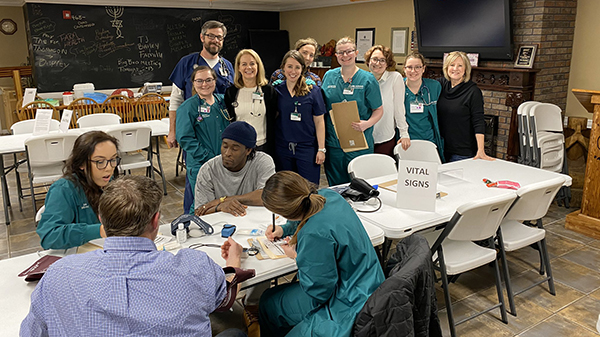Gradine’s smile can light up a room. When one hears her story, it doesn’t take long to realize she is a new person inside and out – and has plenty to smile about.
A former inmate who was incarcerated for 18 years, Gradine’s life looks a lot different than it used to. While in prison, chaplains with The Foundry Ministries helped lead her to a relationship with Jesus Christ. And today she is one of the many success stories of the ministry based in Birmingham. The Foundry helps men and women overcome addiction, poverty, recidivism and homelessness through sharing the gospel’s transforming message and by providing a temporary place to stay on the ministry’s main campus and skills needed to start a job and new life.
“They really made God alive to me and explained who He was,” said Gradine, who shared her story on the ministry’s website, and that she now is on staff at the Foundry Dental Center in Bessemer. “I learned God would accept me just like I was. I didn’t have to do anything but ask Him to come into my life.”
“Before coming to The Foundry, I was just surviving,” she said, but adds she now is “thriving.”
Support is invaluable
John Roland, The Foundry’s chief development officer, expressed appreciation to Southern Baptist churches for being a “cornerstone of support for the ministry.” Most of the men and women they help are Baptist, he said in a phone interview with TAB Media. And the ministry actively seeks out partnerships with Baptist groups, both in the Birmingham area and across the nation, to help transform lives.
It’s exciting to see someone the world “saw as a kind of total waste be redeemed, restored to where their felonies have been dropped by the courts,” said Roland, interim pastor of Robinwood Baptist Church in Birmingham. “The courts have said … ‘You have brought to us a new person.’”
The Foundry Ministries roots can be traced back to 1971, he noted, when it started as the Bessemer Rescue Mission providing refuge to homeless and transient men. But by 1996, new leadership overhauled the ministry’s approach by seeking to break the endless cycle of addiction and homelessness, Roland explained.
“Our current leadership came in and said, ‘Hey, we’re just feeding the same guys. Many of them are addicted,’” Roland said. “They come back to us homeless. [It’s] this toxic charity cycle. … We need to do addiction recovery because that’s the greater need here.”
Today, The Foundry has about 115 paid staff and has helped men and women from 32 states through rescue and recovery programs. Last year the ministry helped nearly 900 men and women, Roland noted. Among its many services The Foundry provides meals three a nights a week for the homeless at their Changed Lives Christian Center and has launched a mobile medical clinic that works closely with medical centers and the University of Alabama-Birmingham’s nursing program. Last year, 280 individual patients received care at no cost.
And it all starts with providing access to the gospel, Roland said.
Gospel is central
“We are Christ-centered … no apologies.” Sharing the gospel is “what we do.”
“The transformation is the power of the gospel,” Roland declared. “That’s the transformation. It’s not to just be sober, because then they’ll go back. It’s to become a new creation.”
The ministry takes a “wholistic approach,” he noted. “The Foundry Way” is based on counseling, case management, education, employment readiness and aftercare. “That’s kind of our secret sauce: mind, body and spirit,” Roland shared.
“Obviously, we want people saved. We are baptizing people. That is the key thing.” But discipleship and life-skills training are a critical part of what The Foundry is known for.
About 78 percent of the people who come to the program are unemployed, Roland said. In response to that need, the ministry focuses on providing an assignment through their three thrift stores and Foundry Auto Sales and Donation Center, which accepts donated cars to repair and sell. While the ministry is fueled through monetary donations from the community, more than 60 percent of their revenue is generated through the thrift stores and auto center, Roland noted.
Preparing for the future
And it’s these assignments that help prepare the men and women with skills – such as marketing, auto repair, administrative, leadership, sales and more – for their next steps toward finding a job.
“Alright, let’s get you your GED. Let’s get you your college degree. Let’s get you a welding certification,” Roland said.
But it goes deeper than that for the people in the program, said Kimberly Spitzer, auto center general manager. “If you were to ask the guys in our program what these cars actually mean, it’s not about the cars,” she told local WBRC last year.
“They’ve all made a commitment to make a change in their lives, and they’ve made a commitment to make a change in these automobiles,” Spitzer said. “So when they see these cars, they see not only their future, but the future of the men and women who come through our program after them.”
For more information about getting involved visit foundryministries.com.






Share with others: